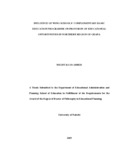| dc.description.abstract | The need to consider accelerated and complementary (alternative) approaches for reaching underserved children particularly in remote and often hard-to-reach
deprived communities is urgent. Thus, complementary basic education provides an avenue to educational access to rural school-aged persons, the Wing Schools
(WS) being one of those aimed at providing increased educational enrolment,
access, retention and transition. This study sought to establish the influence of Wing Schools’ Complementary Basic Education on the provision of educational
opportunities in the Gushegu and Karaga Districts of the Northern Region of Ghana. Specifically, the study investigated the influence of curriculum;
assessment strategies; quality assurance activities; school and community relations and enrolment in Wing Schools on the provision of educational
opportunities to the rural children in Gushegu and Karaga. A descriptive research design was employed and data was collected from staff, pupils, parents’ groups
and management committees of 36 Wing Schools. A census of 113 teachers and
36 headteachers was considered and 30 School Management Committee (SMC)
members were stratified and purposively sampled out of forty-seven (47) SMCs. The pupils were also stratified according to their respective educational districts.
The research instruments employed for data collection were questionnaires for teachers and headteachers, interview guide for SMC and Wing School
coordinating team, and Focus Group Discussion Guide for Wing School graduates. Both descriptive and inferential statistics were employed to analyse the
data. The findings showed that there was an increase in lower primary school enrolment; high pupil retention, survival and transition rates associated with the
Wing Schools. It also came to the fore that fee-free education, free stationery, no
prescribed uniforms and the use of any decent structures for classrooms led to an
increase in the net enrolment rates of pupils in the beneficiary communities. It also came to light that the National Literacy Acceleration Programme (NALAP),
which emphasizes the use of the dominant first language, was upheld in all the Wing Schools leading to further rise in enrolment. Further, the retention capacity
of the Wing School is better than the general retention in Ghana and that of the Northern Region in particular. A simple linear regression showed that increase in
assessment strategies; and quality assurance activities by causing corresponding increase transition of pupils to higher grades. Whereas the curriculum was found
to influence pupils’ access to Wing Schools, the school and community relations,
was found to influence pupils’ retention rate in the Wing Schools. | en_US |

